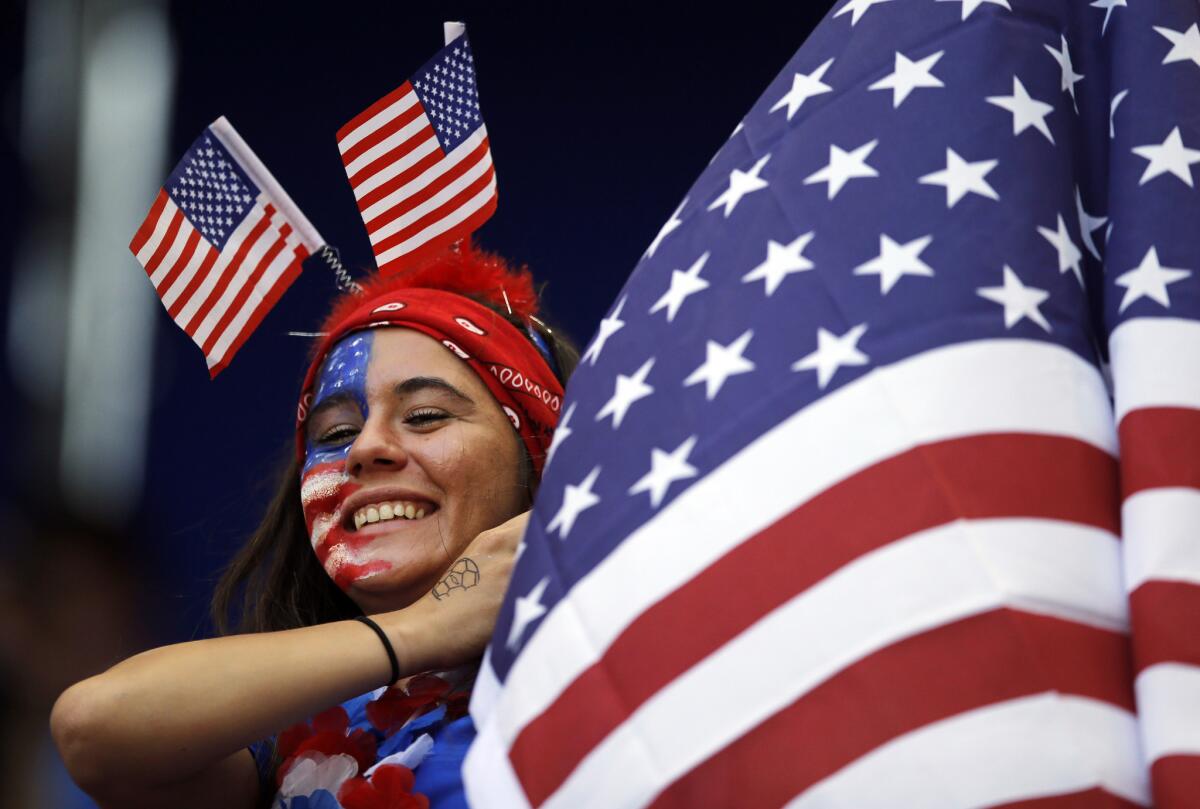Fox Sports is going all in for coverage of Women’s World Cup in Canada

A young spectator watches warm-ups before a women’s international friendly soccer match between South Korea and the United States.
- Share via
When David Neal was directing NBC’s broadcasts of the 2008 Olympics, he decided to build the coverage around swimmer Michael Phelps’ quest to win eight gold medals.
It was a gamble, given the $894 million NBC had paid for the rights to the Games. So when the U.S. fell behind late in Phelps’ second race, the 400-meter freestyle relay, it looked as if Neal’s wager was about to go down the drain.
Instead, the Americans rallied to win by a fingernail, and when Phelps won his eighth and final race a week later, nearly 40 million viewers watched it on NBC.
This month, Neal is supervising another expensive longshot bet. As the man in charge of Fox Sports’ team at the Women’s World Cup in Canada, he will oversee the live broadcasts of all 52 games from the month-long tournament, the longest and largest in women’s soccer history.
And just as in Beijing, Neal will be rooting for the U.S. to make it pay off. “It’s no secret that American viewers want to see American athletes succeed,” he said. “[But] there are things that are completely out of our control.”
Unlike NBC, Fox is gambling more with its airtime than its checkbook. It basically got the U.S. broadcast rights to the women’s tournament — almost as a throw-in — after agreeing to pay FIFA $425 million to televise the 2018 and 2022 men’s World Cups.
But the 200 hours the network will devote to the women’s event is significant, especially considering the U.S. will play no more than seven times in the tournament. Fox will air nearly twice that many games featuring Thailand, Nigeria, Cameroon and Ivory Coast.
“This is like the Olympics,” said Robert Gottlieb, Fox Sports executive vice president and head of marketing. “If you have Olympic fencing on a Wednesday at 3 in the afternoon, yeah, it may not be the most attractive event of the day. But you want the host broadcaster to have reporters there.
“Even if it’s 70 people in Lubbock, Texas, who want to see Nigeria versus whatever, for them not to be able to see it on television would really reflect poorly on us as the stewards of the tournament.”
Nigeria versus whatever won’t move the ratings needle, though. Nor will women’s soccer alone — only two of the nine teams in the National Women’s Soccer League averaged more than 3,700 fans a game last season.
But the rock-star popularity of the U.S. women’s team might. The Americans drew big audiences in their last two major international tournaments, with 13.5 million viewers watching their 2011 World Cup final against Japan on ESPN and a network-record 4.35 million turning into NBCSN for the 2012 Olympic gold-medal game, also against Japan.
Then last month, the U.S. played before sellout crowds in its three-game send-off series — although Fox officials, worried about an early U.S. exit in Canada, privately expressed concern over how poorly the team played at times.
“It is absolutely a gamble,” said Paul Swangard of the Warsaw Sports Marketing Center at the University of Oregon. “However, live sports remains a valuable asset in what will be somewhat of a lull in the sports calendar. That being said, the U.S. team needs to perform well to mitigate the risk. Nationalism would take hold, and the ratings would follow.”
Despite the risk, Fox is spending big, dispatching broadcasters to each of the six World Cup venues and building a two-story studio for its anchor team at scenic Coal Harbor in Vancouver, where its nearly 400 workers have filled more than two hotels.
And with the tournament in Canada, the network will benefit from favorable start times with more than half of the 52 matches kicking off after 6 p.m. EDT. Sixteen of those games will air on Fox’s broadcast channel, with the others scheduled for the company’s rating-challenged cable outlets, Fox Sports 1 and Fox Sports 2. (Ten games will also air in Spanish on Telemundo, with another 21 on NBC Universo.)
“We’re all in,” Gottlieb said. “The way we see it, we’re sitting on something that’s going to explode this summer.”
Maybe. But Fox is also keeping its fingers crossed there will be a carry-over in soccer interest from last year’s men’s World Cup, when 18.2 million viewers tuned in for the group-play game between the U.S. and Portugal on ESPN. That’s the largest audience ever for soccer on U.S. television, narrowly beating the 17.9 million ABC draw for the final of the 1999 World Cup.
The 1999 Women’s World Cup.
“This could be a seminal moment for the development of soccer in the U.S.,” said Neal, who will also direct Fox’s coverage of the next three men’s World Cups. “We want to make a statement.”
Twitter: @kbaxter11
More to Read
Go beyond the scoreboard
Get the latest on L.A.'s teams in the daily Sports Report newsletter.
You may occasionally receive promotional content from the Los Angeles Times.









